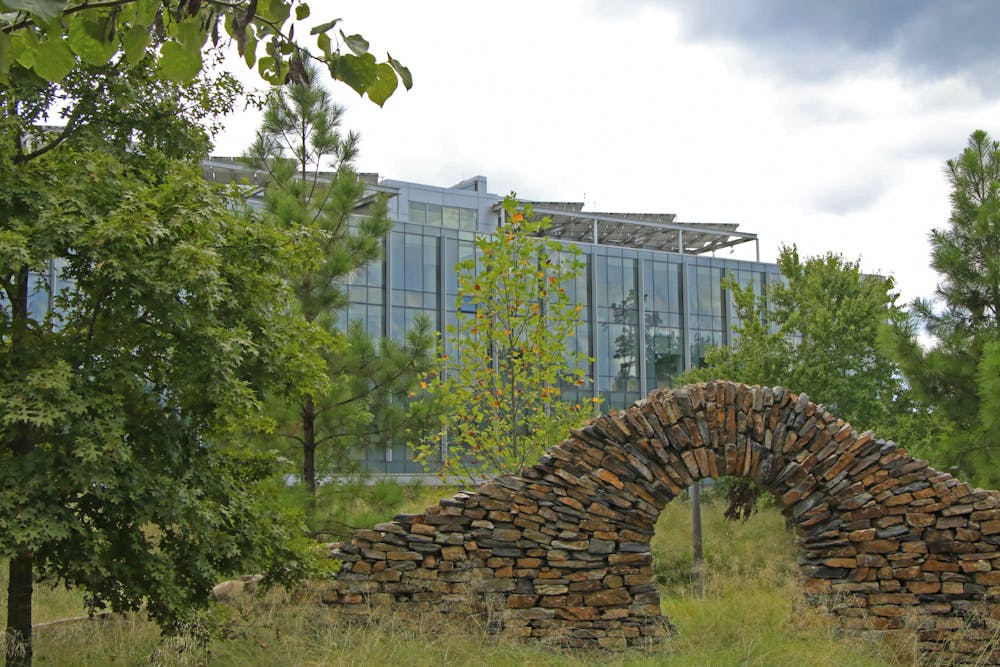Duke launched a collaboration with the Network for Engineering with Nature (N-EWN) on Sept. 5, which looks to augment current work toward nature-based solutions for major infrastructure challenges in the United States.
The partnership with the N-EWN is through the Nicholas Institute for Energy, Environment & Sustainability which defines nature-based solutions as “actions to protect, sustainably manage or restore natural or modified ecosystems to address societal challenges, simultaneously providing benefits for people and the environment.”
“It provides an opportunity for us to engage and broaden our capacity by being part of a larger network that is working in this space,” said Lydia Olander, director of the ecosystem services program at the Nicholas Institute and Duke’s representative within the N-EWN.
Duke joins over 15 partner groups across a wide range of disciplines, including other academic and research institutions, government agencies and a number of nonprofit and private sector organizations.
Established in 2019 by the University of Georgia and the U.S. Army Corps of Engineers, the N-EWN advertises itself as “an active community of researchers, practitioners and educators who are addressing the major infrastructure challenges facing our society while creating opportunities that align ecological, social and engineering processes to achieve multiple societal benefits.”
It promotes a strategy of “Engineering With Nature,” which involves intentionally aligning “natural and engineering processes to efficiently and sustainably deliver economic, environmental and social benefits through collaboration.”
According to Olander, the Nicholas Institute’s pursuit of this partnership was due to the N-EWN’s collaborative approach that allows for shared resources across its partners. Many existing programs at Duke will benefit from access to such resources, including Duke Restore, the Duke Wetland Center, The Climate-Plant Innovation Network, the National Ecosystem Services Partnership and North Carolina Ecosystem Technology.
Olander noted that the partnership was mutually favorable, as Duke’s work on policy, finance and ecology adds to the growing body of research in the field of nature-based solutions.
Students and faculty members from the Nicholas School for the Environment and the Pratt School of Engineering will also be involved in the partnership.
“My goals are to try to get faculty and staff across campus that work in this area to know about the Network and be able to take advantage of it and participate in it,” Olander said. “Hopefully that will enhance the work that they can do.”
Duke is already planning to contribute to a policy symposium the N-EWN is hosting with the National Academy of Sciences in Washington D.C. early next year. By bringing together government partners at both the federal and state levels, Olander hopes stakeholders will be able to “think through some of the issues on nature-based solutions” and start to address challenges such as cost-benefit analysis permitting and finances.
In addition to the symposium, the N-EWN will be coordinating with Duke on a number of other conferences meant to serve as networking opportunities for researchers in the field. These will likely be open to Duke students, providing them with a “community of practice” to develop their expertise, Olander said..
The N-EWN partnership is expected to play a crucial role in advancing Duke’s work towards fulfilling the goals expressed by the Climate Commitment, which has been discussed by administrators and faculty in recent months.
“I see nature-based solutions as a great tool for both mitigating climate change and reducing carbon in the atmosphere, as well as — and maybe even more so — for reducing climate risk,” Olander said. “Places where we can integrate it will be of huge value to producing solutions to climate change that help make our livelihoods and welfare better overall.”
The Duke Climate Commitment’s five-pronged action plan focuses on education, research, sustainable operations, external engagement and community partnerships. While each of these elements stands to benefit by collaborating with the N-EWN, Olander is particularly excited about the opportunities for advancing education.
“One of the partners is the only institution I know [of] in the U.S. that actually is building a training program in this space… they have a master’s program in engineering with nature at [the] University of Georgia,” she said.
Olander hopes that the partnership will open doors for students and faculty members across the University to further their research and community outreach efforts in the environmental engineering space.
“I think a lot of people think about electric vehicles and solar power [when they think about addressing the climate crisis], and we want them to also say ‘and nature-based solutions,’” she added.
Get The Chronicle straight to your inbox
Signup for our weekly newsletter. Cancel at any time.

Zoe Kolenovsky is a Trinity sophomore and news editor of The Chronicle's 120th volume.

